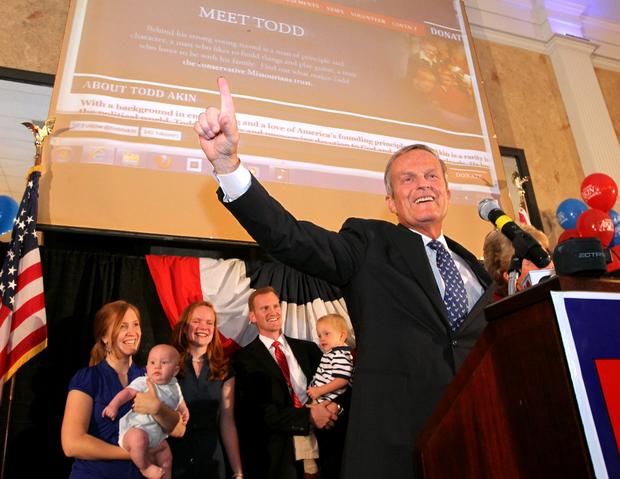Akin controversy proves "all politics is local" is a thing of the past
(CBS News) If anyone this year has reason to doubt the old adage coined by former House Speaker Tip O'Neill that "all politics is local," it's Rep. Todd Akin.
The six-term Republican survived the Republican Senate primary in Missouri after outside groups with a national agenda spent a slew of cash on the race. Then, after his offensive remarks about rape and abortion created an uproar on Sunday, Akin faced national condemnation and saw his support from the Republican Party, the Tea Party and American Crossroads all evaporate.
Akin says he deserves another chance: "I feel just as strongly as ever that my background and ability will be a big asset in replacing [Democratic Sen.] Claire McCaskill," he said. But in the era of super PACs, nationwide grassroots mobilization and nonstop media attention, Akin may not survive the scrutiny.
Republican Rep. Joe Walsh of Illinois -- no stranger to controversy himself -- called Akin's comments "absolutely offensive, ugly, misguided, wrong [and] insulting."
"I found it to be terribly disappointing and unbelievably insulting," he continued.
That said, the congressman added, "We live in an age where -- it's no exaggeration -- when I walk outside my house to the time I go home and go to bed at night, I've got one to two to three cameras following me... Because of this age we live in, every word I say can get sliced and diced and put up on YouTube."
Walsh is engaged in one of this year's most high-profile congressional races in Illinois' newly-redrawn 8th district. As a freshman who came into office with the Tea Party wave of 2010, Walsh has focused his campaign on the national issues that drive conservatives to the polls, like President Obama's health care law and the national debt. His Democratic opponent, Tammy Duckworth, meanwhile, is an Iraq war veteran with support from Mr. Obama, Chicago Mayor Rahm Emanuel and liberals nationwide.
"My thesis would be everything's national" in congressional elections, Walsh said to CBSNews.com. "Because our national problems are still so big and so pressing, it dwarfs anything local."
At the numerous town halls that Walsh has hosted, which he proudly describes as "freewheeling affairs," the congressman said his constituents have been overwhelmingly interested in national issues like job creation and the federal debt.
Furthermore, Walsh argues, Congress doesn't function the way it once did.
"The game has changed -- Washington is broke, we banned earmarks, so congressmen can't run around for re-election promising certain projects. Those days are gone," he said. "People don't expect goodies from Washington because there's just nothing left to give."
But if all politics is now national, Democrats say they have the advantage this year.
"Every election is ultimately a choice between two candidates at a local level," said Jesse Ferguson, a spokesman for the Democratic Congressional Campaign Committee (DCCC), the campaign arm for House Democrats. "But there are overriding themes and contrasts that are very powerful this year because of the deep sense of buyer's remorse with this Republican Congress."
The April 14, 2011, House vote on the GOP budget has done more to nationalize this year's congressional elections than even the presidential campaign, Ferguson contends. "Now that Congressman Paul Ryan's the ticket-mate for them, [Republicans] better brace themselves because they can't escape that debate," he said, alluding to the fact that the GOP vice presidential nominee authored the controversial House budget.
The National Republican Congressional Committee (NRCC), by contrast, has launched four ads so far with different messages tailored for the districts they're targeting.
While the GOP predicts its candidates will focus on national themes like health care reform and the economy, it also expects them to tap into local networks and keep up retail politicking. Republican candidate Mark Meadows in North Carolina's 11th district, for instance, homeschooled his children and is tapping into his homeschooling network to win local support.
"In terms of getting out your vote, all politics is local when you are building an aggressive ground game and targeting your voters," NRCC spokesperson Andrea Bozek said. "I think you'll see candidates across the country embracing national themes [but] using their local experiences... to add credibility to why they need to go to Washington."

